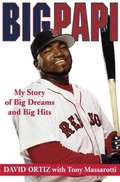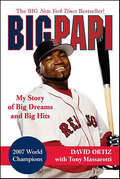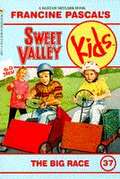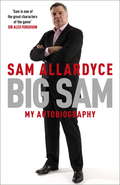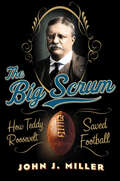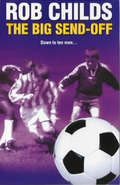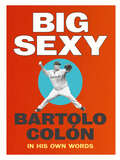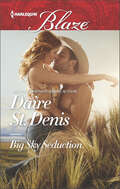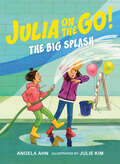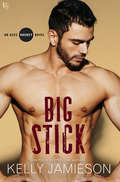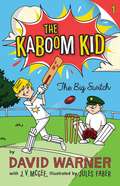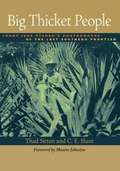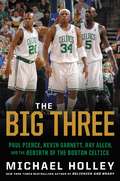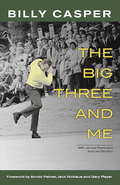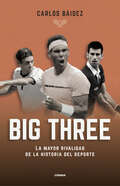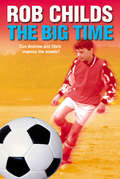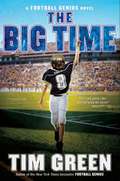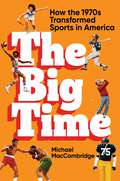- Table View
- List View
Big Papi: My Story of Big Dreams and Big Hits
by David Ortiz Tony MassarottiAutobiography of the famous baseball legend David Ortiz.
Big Papi: My Story of Big Dreams and Big Hits
by David Ortiz Tony MassarottiThe inspiring and dramatic story of Big Papi, from growing up poor to becoming one of the most popular and successful players in Major League Baseball.Raised in the Dominican Republic, signed by the Seattle Mariners, and released by the Minnesota Twins, David Ortiz landed in baseball-crazy Boston, of all places. Generally regarded as an underachiever to that point in his career, Ortiz blossomed into one of the most feared and adored sluggers in baseball while altering the course of the game's history, helping Boston win its first World Series in eighty-six years and thereby breaking the infamous "Curse of the Bambino."Along the way, Ortiz established his place as a truly Ruthian figure in the annals of our national pastime: an imposing figure in the batter's box, yet an endearing man to the young, particularly in his native Dominican Republic, where he has focused his charitable efforts on improving the health of children. The son of two caring parents, and a loving father of three, Ortiz is a hero to many.Now, in his memoir, the man affectionately known as "Big Papi" recounts his life from growing up in an impoverished area of the Dominican Republic (where baseball is king) to his ascension in Boston (where he became one). Ortiz discusses, in detail, his historic and record-setting performances as a member of the Red Sox, his exploding popularity, the challenges of playing in Boston, and life in the Red Sox clubhouse.Big Papi is a unique memoir by a charismatic man who appeals to young and old, on the baseball field or off.
The Big Race (Sweet Valley Kids #37)
by Francine Pascal Molly Mia StewartElizabeth and Jessica Wakefield can't wait to build and race their own cars in the upcoming soapbox derby. Ken Matthews keeps bragging about how great his car is, and the twins are determined to beat him. They know they can do it if they work together -- but they have a big fight right before the race. Can the twins make up in time to win? Don't miss any of the books in this exciting series!
Big Sam: My Autobiography
by Sam AllardyceWith nearly 20 years as a player - plus almost 25 years as a coach and manager - under his belt, Sam Allardyce is one of the most recognisable figures in British football.'Big Sam' has been a robust defensive general throughout the seventies and eighties, and an imposing touchline presence as a gaffer since 1994. Until he left West Ham in the summer of 2015, he was the second longest-serving manager in the Premier League behind Arsene Wenger.Over the last 42 years, Allardyce has seen it all. The game he so loves is radically different to that in which he made his debut back in 1973, and in telling his wonderfully colourful story for the very first time, Allardyce talks intriguingly about the changing face of players and managers. His autobiography positively crackles with characteristic insight, honesty and hard-hitting opinions.
Big Sam: My Autobiography
by Sam AllardyceFootball fans will love this insight into the life and mind of Big Sam. With nearly 20 years as a player - plus almost 25 years as a coach and manager - under his belt, Sam Allardyce is one of the most recognisable figures in British football.'Big Sam' has been a robust defensive general throughout the seventies and eighties, and an imposing touchline presence as a gaffer since 1994.Over the last four decades, Allardyce has seen it all. The game he so loves is radically different to that in which he made his debut back in 1973, and in telling his wonderfully colourful story for the very first time, Allardyce talks intriguingly about the changing face of players and managers. His autobiography positively crackles with characteristic insight, honesty and hard-hitting opinions.
The Big Scrum: How Teddy Roosevelt Saved Football
by John J. Miller“The story . . . has as much vigor and passion as Roosevelt himself. It’s a fascinating and thoroughly American tale.” —Candice Millard, New York Times–bestselling authorJohn J. Miller delivers the intriguing, never-before-told story of how Theodore Roosevelt saved American Football—a game that would become the nation’s most popular sport. Miller’s sweeping, novelistic retelling captures the violent, nearly lawless days of late 19th century football and the public outcry that would have ended the great game but for a crucial Presidential intervention. Teddy Roosevelt’s championing of football led to the creation of the NCAA, the innovation of the forward pass, a vital collaboration between Walter Camp, Charles W. Eliot, John Heisman and others, and, ultimately, the creation of a new American pastime. Perfect for readers of Douglas Brinkley’s Wilderness Warrior, Michael Lewis’s The Blind Side, and Conn and Hal Iggulden’s The Dangerous Book for Boys, Miller’s The Big Scrum reclaims from the shadows of obscurity a remarkable story of one defining moment in our nation’s history. “The first complete account of Roosevelt’s football rescue . . . a great story.” —The Wall Street Journal“Fascinating . . . At a time when a coalition of suburban soccer moms and misguided caretakers of American athletics are hell-bent on watering down the game of football, you should take the time to read this book.” —Sal Paolantonio, ESPN“A richly detailed history of football’s founding . . . a useful primer, introducing us to some of the sport’s most famous pioneers.” —The New York Times“Enjoyable history of a seldom explored turning point in American sports history.” —Booklist
The Big Send-Off
by Rob ChildsOff! Off! Off!Danebridge school football team - captained by goalie Chris Weston - have had a shaky season in the League, but a good Cup run. Now they face a crucial semi-final replay - a match they must win if they are to meet their arch-rivals, Shenby, in the Final. Will Chris lift the Cup? Find out what happens in this new action-packed story in the bestselling BIG soccer series - everything from a nerve-jangling penalty shootout to a shock sending-off!
Big Sexy: Bartolo Colón: In His Own Words
by Bartolo ColónThe All-Star pitcher tells his incredible life story from picking coffee in the Dominican Republic to reaching MLB icon status in America. Legendary baseball pitcher Bartolo Colón—also known as Big Sexy—is one of the most beloved athletes to ever play the game. Honored with the Cy Young Award in 2005, Colón has won more games than any other Latin American–born pitcher. But more importantly, Big Sexy has captured the hearts of fans as well as the elite competitors he has played against. In Big Sexy: In His Own Words, he opens up as never before, telling the story of his life and his decades-long career. The result is a touching and deeply personal story of a truly unique baseball life.
Big Shots: Today's Best Athletes
by Alex BhattacharjiChildren's biographies of today's best athletes.
Big Sky Seduction
by Daire St. DenisThe best mistakes are worth repeating... There's no room for chaos in interior designer Gloria Hurst's life. Everything in order, everything under control. No exceptions. Well, aside from one wicked, messy, incredibly passionate night with rodeo rider Dillon Cross. He's macho, overconfident and sex appeal incarnate. He's everything Gloria despises...so why is he the secret star of her wildest dreams? Now her control is about to be seriously tested. Dillon has hired her to help him sell a ranch he's inherited. Gloria can't escape him, or the way he ignites a delicious hunger in her for more than just his body. Dillon Cross is a mistake Gloria wants to make over and over again...until she loses control and all hell breaks loose.
The Big Splash (Julia on the Go!)
by Angela AhnJulia and her swim team struggle with a new strict coach, but she is determined to make a big splash regardless in this buoyant illustrated chapter book for ages 7 and up. For fans of Mindy Kim and Jasmine Toguchi.Julia is dismayed to learn that Coach Marissa has to leave the Vipers swim team for an urgent family matter. Coach Nathan, their new temporary coach, is strict and humorless. He doesn't even let them have Splash Time! And it's not just Julia who's upset — two of her teammates have even quit the team. So it's no surprise that the team is not enthusiastic when Coach Nathan asks them to put together a car wash fundraiser for the team.But then they learn that there's going to be a big increase in pool rental fees, which means the Vipers may lose practice days, or worse, not be able to swim at all. Julia takes the lead and gets the Vipers organized. Along the way, she learns more about her nemesis, teammate Olivia, and even Coach Nathan. Maybe first impressions aren't always the most accurate.
Big Stick: An Aces Hockey Novel (Aces Hockey #8)
by Kelly JamiesonA brooding hockey hunk learns to embrace life—and love—from a single mom who takes the world one puck at a time. “Kelly Jamieson is my go-to author for hockey romance.”—USA Today bestselling author Jami Davenport Big move . . . Jodie’s motto is “Don’t wait for the perfect moment—take the moment and make it perfect.” And that’s just what she decides to do when she moves to Chicago with her two-year-old daughter. Now all Jodie needs is a place to live, and her best friend’s boyfriend has just the answer. Big stick . . . Nick Balachov has zero interest in socializing, partying, or flirting right now. It’s not that he doesn’t like women. He loves them. It’s just that hockey, casual hookups, and hanging out at home are enough for him these days. Now Nick has a big problem—because the woman living in his empty coach house is a major distraction. Big deal? The more Nick tries to keep his distance, the more Jodie needs him—around the house, that is. First he helps with the snowstorm, then the power outage. Nick even finds himself trying to impress her little girl. What the hell is wrong with him? Jodie represents everything Nick doesn’t want. But maybe she’s just what he needs. . . .Advance praise for Big Stick “Oh, the feels! Big Stick is a sexy romance that will leave readers begging for the next in the series. Kelly Jamieson has me hooked.”—Tracy Goodwin, internationally bestselling author of Ice Hot: A New York Nighthawks Novel“Kelly Jamieson’s characters fly off the page. I wouldn’t kick grumbly hockey-hottie Nick out of bed––even if he did pass out on accident. One-click Nick and Jodie. You won’t be disappointed.”—Tricia Lynne, author of Moonlight & Whiskey Kelly Jamieson’s USA Today bestselling Aces Hockey series can be read together or separately: MAJOR MISCONDUCT OFF LIMITS ICING TOP SHELF BACK CHECK SLAP SHOT PLAYING HURT BIG STICK Don’t miss any of Kelly’s alluring reads: The Bayard Hockey series: SHUT OUT | CROSS CHECK The Last Shot series: BODY SHOT | HOT SHOT | LONG SHOT The standalone novel: DANCING IN THE RAIN This ebook includes an excerpt from another Loveswept title.
Big Sticks: The Batting Revolution of the Twenties
by William CurranBig Sticks is an exhilarating account of the home-run barrage of the twenties and its most illustrious purveyor, Babe Ruth. William Curran recreates all the excitement of the decade when the long ball first came into fashion and baseball was changed forever into a hard-hitting offensive game. Although most fans are familiar with the greatest stars of the past, many are unfamiliar with the actual achievements of men like Ty Cobb, George Sisler, Lou Gehrig, Rogers Hornsby, and even Babe Ruth. Curran gives us the stories of these hitters' greatest moments in the years of their greatest glory--years when teams scored an average of 11 runs a game, when a .374 hitter could be shipped back to the minors, years of unprecedented, and unequaled, hitting. The understood explanation for this power surge has been the notion that the ball changed in 1920. Curran comes up with his own reasons--Ruth's new style of swing, copied from Joe Jackson; the outlawing of the spitball, which put pitchers at a great disadvantage; the use of clean baseballs after Ray Chapman was beaned by a dirty, uncontrollable ball and died--and in so doing explodes the myth of the rabbit ball. Big Sticks is the first book to chronicle a decade that started with a Ruthian wallop and rose to a crescendo in 1930 before rules changes and slight changes in the ball tempered the triumphs of the twenties.
The Big Stretch
by Duane DeckerBlue Sox 6. Ex-bat-boy, Buster Stookey, has a chance to play 1st base for the Blue Sox. He's replacing Marty Blake and it won't be easy even if Blake has become a human sieve. Blake can still hit the long ball and the fans still love him--so does the front office.
The Big Switch: Kaboom Kid #1
by David WarnerMeet Little Davey Warner. He lives in Sandhill Flats with his mum and dad and his brother Steve - and his stinky dog Max. Davey and his schoolmates -even Max - are MAD for cricket. All they want to do is play ... but there's always something getting in their way. In this first book in the series, Davey and his friends have a big game coming up against Shimmer Bay, their arch rivals in the local comp. They need to practise, and spend all their free time at school - in the morning and at lunchtime - making sure they'll be ready. But disaster strikes. Davey and his friends find out their new teacher is Mr Mudge, a strict grump who HATES cricket even more than he hates Year 6 boys, and thanks to bully Mo Clouter, they find themselves on detention. Which means no cricket. The boys are desperate. They're going to need to pull something special out of the bag to win against Shimmer Bay. Davey's mates have some ideas, one that could really get them into trouble, but it means getting around Mo, who seems to be everywhere they turn. But Davey has an idea that he thinks may just work ... he just needs to practise. Will he pull it off in time for the game against Shimmer Bay?
The Big Tee Ball Game
by Larry Dane BrimnerGabby discovers that cheating at tee-ball is not the best way to win.
Big Thicket People
by Thad Sitton C. E. HuntLiving off the land-hunting, fishing, and farming, along with a range of specialized crafts that provided barter or cash income-was a way of life that persisted well into the twentieth century in the Big Thicket of southeast Texas. Before this way of life ended with World War II, professional photographer Larry Jene Fisher spent a decade between the 1930s and 1940s photographing Big Thicket people living and working in the old ways. His photographs, the only known collection on this subject, constitute an irreplaceable record of lifeways that first took root in the southeastern woodlands of the colonial United States and eventually spread all across the Southern frontier. Big Thicket People presents Fisher's photographs in suites that document a wide slice of Big Thicket life-people, dogs, camps, deer hunts, farming, syrup mills, rooter hogs and stock raising, railroad tie making, barrel stave making, chimney building, peckerwood sawmills, logging, turpentining, town life, church services and picnics, funerals and golden weddings, and dances and other amusements. Accompanying each suite of images is a cultural essay by Thad Sitton, who also introduces the book with a historical overview of life in the Big Thicket. C. E. Hunt provides an informative biography of Larry Jene Fisher.
The Big Three: Paul Pierce, Kevin Garnett, Ray Allen, and the Rebirth of the Boston Celtics
by Michael HolleyNew York Times bestselling sportswriter Michael Holley tells the inside story of how Paul Pierce, Ray Allen, and Kevin Garnett joined together to form the most dominant team in basketball and lead the Boston Celtics to their first championship in more than two decades.The first of "The Big Three" was Paul Pierce. As Boston Celtics fans watched the team retire Pierce's jersey in a ceremony on February 11, 2018, they remembered again the incredible performances Pierce put on in the city for fifteen years, helping the Celtics escape the bottom of their conference to become champions and perennial championship contenders. But Pierce's time in the city wasn't always so smooth. In 2000, he was stabbed in a downtown nightclub eleven times in a seemingly random attack. Six years later, remaining the sole star on a struggling team, he asked to be traded and briefly became a lightning rod among fans.Then, in 2007, the Boston Celtics General Manager made two monumental trades, bringing Ray Allen and Kevin Garnett to Boston. A press conference on July 31, 2007 was a sight to behold: Pierce, KG, and Ray Allen holding up Celtics jerseys for the flood of media. Coach Doc Rivers made sure the team bonded over the thought of winning a title and living by a Bantu term called Ubuntu, which translates as "I am because we are." Rivers wanted to make it clear that togetherness and brotherhood would help them maximize their talent and win. What came next -- the synthesis of the Celtics' "Big Three" and their dominant championship run -- cemented their standing as one of great teams in NBA history, a rival to Kobe Bryant's Lakers and LeBron James's Cavaliers.This is the team that brought excitement back to the Garden, and therefore to one of the most storied franchises in all of sports. They met their historic rivals, the Lakers, in the 2008 NBA Finals, winning the series in Game 6, in a rout on their home court with a raucous, concert like atmosphere. Along the victory parade route, Paul Pierce smoked a cigar -- as a tribute to legendary former Celtics Coach Red Auerbach. In a city now defined by a wealth of championships, "The Big Three" joined the club. Michael Holley, the premier chronicler of Boston sports, brings their story to life with countless untold stories and behind-the-scenes details in another bestselling tome for New England and sports fans across the country.
The Big Three and Me
by Billy CasperBilly Casper had a higher winning percentage than Arnold Palmer, he won twice as many times on the PGA Tour as Gary Player, and during his career he finished in the top twenty-five more consistently than Jack Nicklaus. And yet, when golf historians write about the legends of the game, with special attention paid to the above-listed "Big Three," his name is often left out of the discussion, or is at best an afterthought.In this fascinating autobiography, Casper tells his life story, shining candid insight into the man who quietly collected fifty-one PGA Tour victories, the seventh highest total in history.
The Big Three and Me
by Billy Casper James Parkinson Lee BensonThe Big Three and Me by Billy Casper, with James Parkinson and Lee Benson
Big three. La mayor rivalidad de la historia del deporte
by Carlos BáidezBig Three es el único libro que narra la mayor rivalidad deportiva de la historia, la que enfrenta a los tres mejores tenistas de todos los tiempos: Roger Federer, Rafa Nadal y Novak Djokovic. Durante dos décadas, los protagonistas de este libro han dominado con gran autoridad el circuito ATP, disputándose los Grand Slams, las grandes competiciones y el número uno del ranking mundial. En una batalla física y psicológica sin precedentes, han deleitado a los aficionados con duelos inolvidables que será difícil que volvamos a vivir. Carlos Báidez analiza en Big Three los entresijos de la ya legendaria rivalidad de los tres mayores genios de la raqueta. Un recorrido detallado desde su infancia hasta su lucha actual por ser el mejor tenista de siempre. En el camino, nos muestra el rostro más humano de Federer, Nadal y Djokovic, además de permitirnos revivir sus momentos de mayor gloria y sus derrotas más sonadas.Una obra imprescindible para cualquier aficionado al deporte, que aporta innumerables argumentos y datos para que el lector pueda decidir quién es, en su opinión, el mejor tenista de la historia. La crítica ha dicho:«Lectura obligada.»Conrado Valle, periodista «Báidez aporta gran cantidad de información desde un punto de vista novedoso: el de analizar a cada uno de ellos en relación con los otros dos para que el lector opine quién es el mejor de la historia. También para que sea consciente de la excepcionalidad de haber vivido y disfrutado de unos años estelares.»Pedro Zuazua, El País«Federer, Nadal y Djokovic frente a frente, para admirar esta rivalidad prolongada en el tiempo. Librazo de Carlos Báidez. ¿A qué esperáis para disfrutar de esta joya?»Deporte y libros «Quería ampliar la perspectiva que los aficionados tienen sobre los tres jugadores y lo he hecho entrecruzando sus vidas, como si se tratara de una película.»Entrevista a Carlos Báidez en La SER«Detalla con rigurosidad y precisión de cirujano, y apoyado en datos estadísticos, los logros de cada uno de estos fenómenos: Roger Federer, Rafa Nadal y Novak Djokovic. Comparándolos entre ellos desde sus inicios en la infancia. Y siempre dando al lector la oportunidad de hacer su elección, o decantarse por uno según sus filias y sus fobias.»Las lecturas de Oscar «Recomendadísimo.Con una ilustración maravillosa y que te atrapa de principio a fin. ¡Todos a comprarlo ya mismo!»José Morón, redactor jefe de Punto de Break «Carlos Báidez recorre la vida de los tres desde sus inicios y aporta datos novedosos sobre estas leyendas.»Marca
The Big Time
by Rob Childs"THIS IS WHERE WE BELONG - IN THE BIG TIME!"Andrew and Chris Weston have both been invited to attend a special summer coaching course at one of the country's top football clubs. The brothers are determined to give it their best shot, hoping to impress United's scouts. Another bonus is the chance to be ball boys at a World Cup qualifying match between England and Holland. But the big event turns out to be even more explosive than anyone could ever have guessed...!
The Big Time
by Tim GreenThings couldn't be going better for Troy White. <P><P>The Atlanta Falcons' football genius is at the top of his game, helping the team get to the playoffs. Agents and lawyers are knocking on his door with big-money offers for the upcoming season. And his own football team has just won the Georgia State Championship! <P><P>Troy's celebrating with his friends at linebacker Seth Halloway's mansion when another lawyer comes knocking-and he says, "I think I'm your father." <P><P> In that instant, Troy's life is changed. <P><P> Powerfully charged from start to finish, this is an amazing portrayal of Troy's struggle to make his lifetime dreams of being with his father come true. Filled with page-turning excitement as a high-stakes deal increases the clash of family tension, The Big Time is an unforgettable experience.
The Big Time: How the 1970s Transformed Sports in America
by Michael MacCambridge&“Indispensable history.&” –Sally Jenkins, bestselling author of The Right Call A captivating chronicle of the pivotal decade in American sports, when the games invaded prime time, and sports moved from the margins to the mainstream of American culture. Every decade brings change, but as Michael MacCambridge chronicles in THE BIG TIME, no decade in American sports history featured such convulsive cultural shifts as the 1970s. So many things happened during the decade—the move of sports into prime-time television, the beginning of athletes&’ gaining a sense of autonomy for their own careers, integration becoming—at least within sports—more of the rule than the exception, and the social revolution that brought females more decisively into sports, as athletes, coaches, executives, and spectators. More than politicians, musicians or actors, the decade in America was defined by its most exemplary athletes. The sweeping changes in the decade could be seen in the collective experience of Billie Jean King and Muhammad Ali, Henry Aaron and Julius Erving, Kareem Abdul-Jabbar and Joe Greene, Jack Nicklaus and Chris Evert, among others, who redefined the role of athletes and athletics in American culture. The Seventies witnessed the emergence of spectator sports as an ever-expanding mainstream phenomenon, as well as dramatic changes in the way athletes were paid, portrayed, and packaged. In tracing the epic narrative of how American sports was transformed in the Seventies, a larger story emerges: of how America itself changed, and how spectator sports moved decisively on a trajectory toward what it has become today, the last truly &“big tent&” in American culture.
